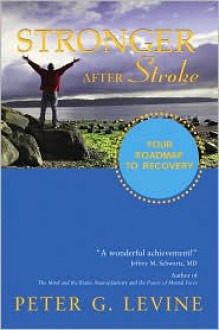
This is a wonderful true to life book, written by the sufferer of a major cerebrovascular accident experienced at the very young age of thirty. Having just received his sergeant’s strips as a British Policeman, Catshill is cut down to a physical half, with a severely damaged long and short-term memory and at first a total lack of coherent speech. He had to learn how to regain control of his motor functions, especially those on the entire right side of his body, and his mind. The man even had to ‘retrain’ his injured brain to see through what had become a suddenly ‘disconnected’ right eye. His courage, honesty, and determination shine through in proverbial buckets.
Catshill has survived not only this story’s devastating stroke, but two more less severe episodes since. That is that they were considerably less severe than the first, but by no means inconsequential. In his rebuilt life he has become a first class autobiographer and in another genre fiction writer. This is the sort of story that should fortify the determination of any one of us having fallen into some form of severe health crisis. Except sadly, our own minds are likely to be so shattered or simply pre-occupied that we will fail to benefit from any memories from this amazing story about the will to recover.
This is an immensely humorous book, though of course often of a very black nature, but one that raises genuine belly laughs at that, and so it should for live is unbearable if we try to treat every unfortunate situation with only the gravity it naturally generates. It goes without saying that it also inevitably moistens one’s eyes. I felt at liberty to laugh at Catshill’s struggles, laughing with him, but taking the seriousness, the mental depression, the physical distress on-board.
In many ways this will always be a unique book, as it is rare for anyone to recover from such major trauma, and to also have the intellectual ability to subsequently write so well about the event. When the trauma is of the nature of a stroke, a literal cerebral infarction, then this book must be seen as all the more remarkable. This isn’t a some imagined third person narrative or ghost-written augmentation of the victim’s capacity, this is true, direct, gritty autobiography.
Some living individuals don’t come out of this narrative at all well, as brutal honesty extends beyond the author himself. I trust that their identities are well hidden. Arguably, biography can only be real when the wide field is truly accurate. There is no implied criticism on my part, only reason that would always prevent me getting to close to publicly disclosed personal truth. Memoir is an often-painful genre. As we read in this story, we notice how a simple sentence, spoken or written, can be totally devastating or by tone or tiny change be the greatest of empowering gifts. Recovery is always easier with the kindness of others and can hang in the balance either way on very few targeted words. The words in this book are chosen and ordered to strong affect.

 Log in with Facebook
Log in with Facebook 






